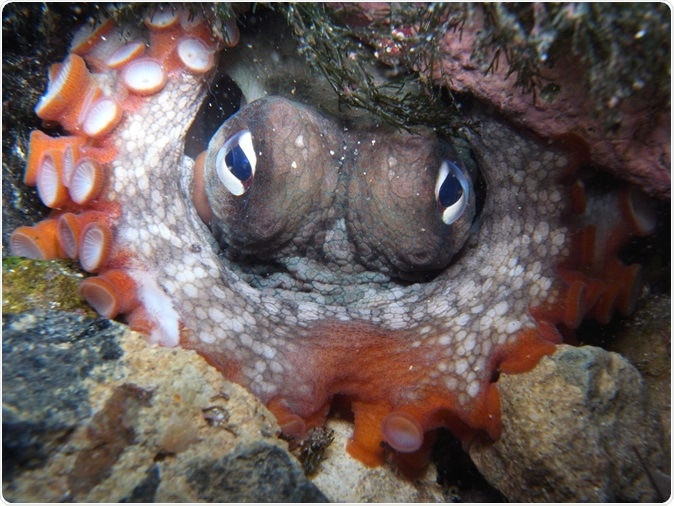A new study has found that when octopuses are intoxicated with MDMA, they act like humans who are high on the same drug. This has led to speculations that humans and octopuses could have an evolutionary link. The results of the study titled, 'A Conserved Role for Serotonergic Neurotransmission in Mediating Social Behavior in Octopus', is published in the latest issue of the journal Current Biology.

Gloomy Octopus, Octopus tetricus, clearly not on ecstacy! Image Credit: S.Rohrlach / Shutterstock
The team of researchers at the Johns Hopkins University School of Medicine looked at the genome or genetic make- up of a kind of octopus that is usually not friendly towards its fellows and tested mood-altering drug MDMA or ecstasy on them. The behavioural reactions of the animals were similar to humans when they take ecstasy write the authors. The study was led by Gül Dölen, assistant professor of neuroscience at the Johns Hopkins University School of Medicine who explained that the brains of these octopuses are more similar to snails than to humans but the behavioural reactions noted are similar to humans. She said that this could mean that the signalling molecules such as the neurotransmitters may be similar in octopuses and humans and may have been conserved over evolutionary progress. These brain chemical or neurotransmitters are responsible for the social behaviours that are seen here, she said.
For this study the team conducted an experiment where there are three connected water chambers. One of these chambers is empty, one of them has a plastic action figure trapped within a cage and yet another has a male or a female laboratory bred octopus trapped within a cage. The test animals were four male and female octopuses who were administered MDMA. The drug was presented in a liquefied form within a beaker in which the test animals were dropped. They absorbed the MDMA through their gills. For the next 30 minutes the test animals were placed inside the experimental chambers.
According to Dolen, the test animals tended to spend most of their time in the chambers that had caged laboratory bred male octopuses. They hugged the cages and placed their mouth parts over the cages, she explained. Dolen said humans on MDMA also touch each other more frequently when on MDMA. The animals on MDMA were also more playful than usual and were seen to be moving around doing “water acrobatics” or fondling the aquarium bubbler, said Dolen. This could be the result of the euphoria that MDMA produces even when humans take this drug.
Without MDMA these test animals would avoid the only male octopuses that are caged in the chamber. Dolen says, this means that the normal social behaviours are suppressed and these become uninhibited when MDMA is administered. Dolen said, “Octopuses will suspend their antisocial behaviour for mating, for example. Then, when they are done mating, they go into aggressive, asocial mode.” “Even during mating the male will just leave his sperm and depart as quickly as possible, because if he sticks around she’ll attack him,” said Dölen. With the drug their behaviour towards other softened.
The study was further advanced with Eric Edsinger, a research fellow at the Marine Biological Laboratory in Masscusetts, to see if octopuses and humans have common genetic make-up that made them react in similar manners. They noted that both species share genomic codes for a transporter binds the neurotransmitter serotonin. Serotonin is responsible for mood regulation. Serotonin activity rises when exposed to ecstasy say researchers.
Dolen agreed that these were preliminary findings and more studies are needed to understand the mechanism of this behavioural change better.